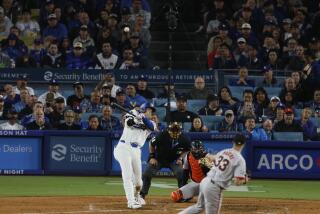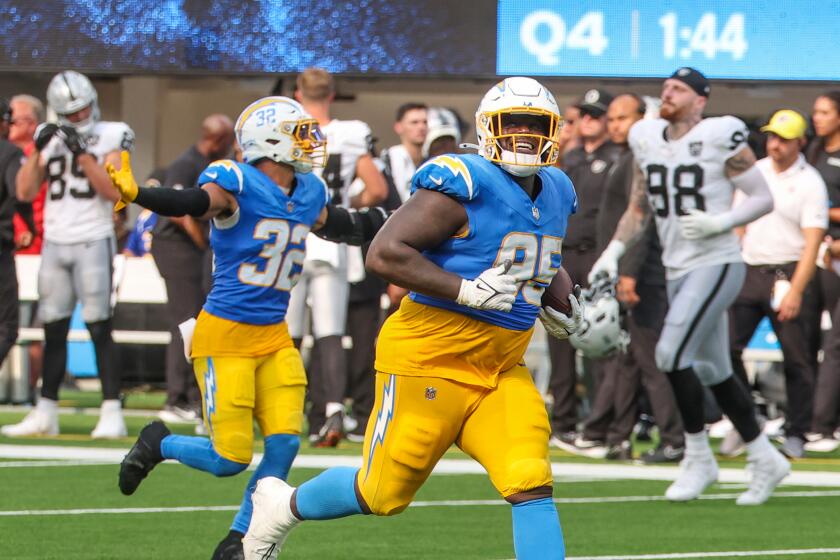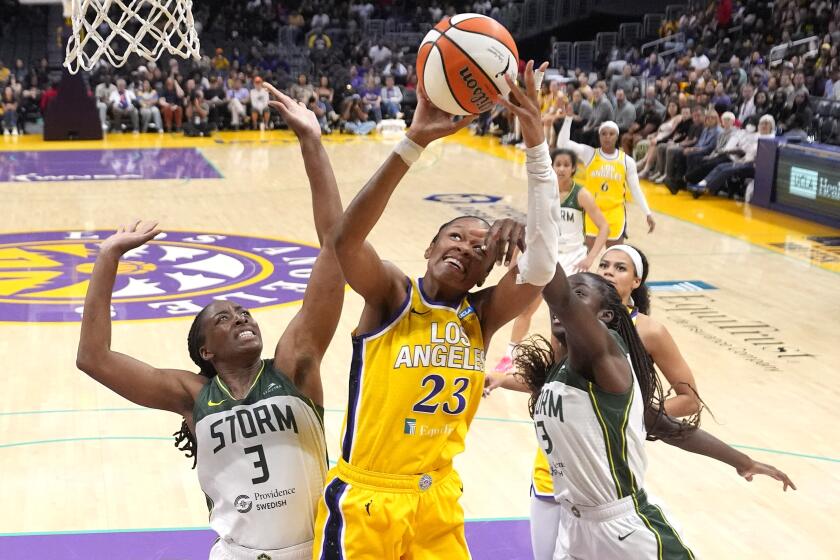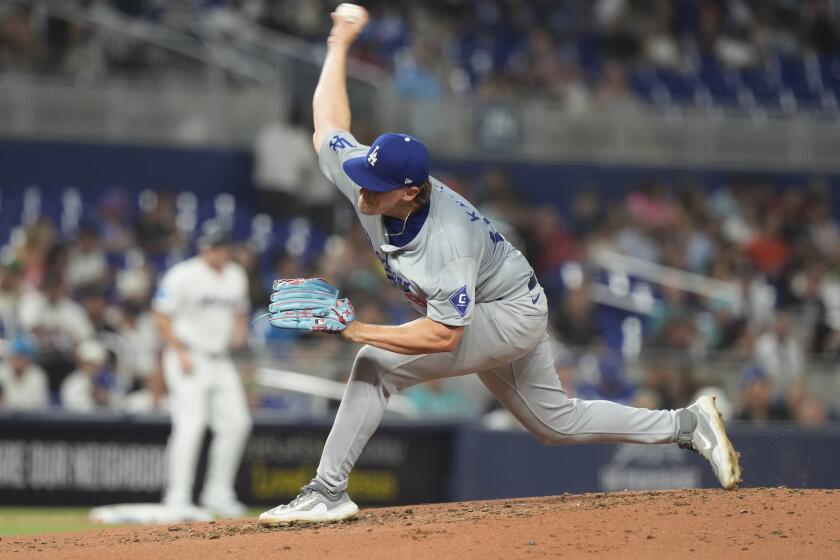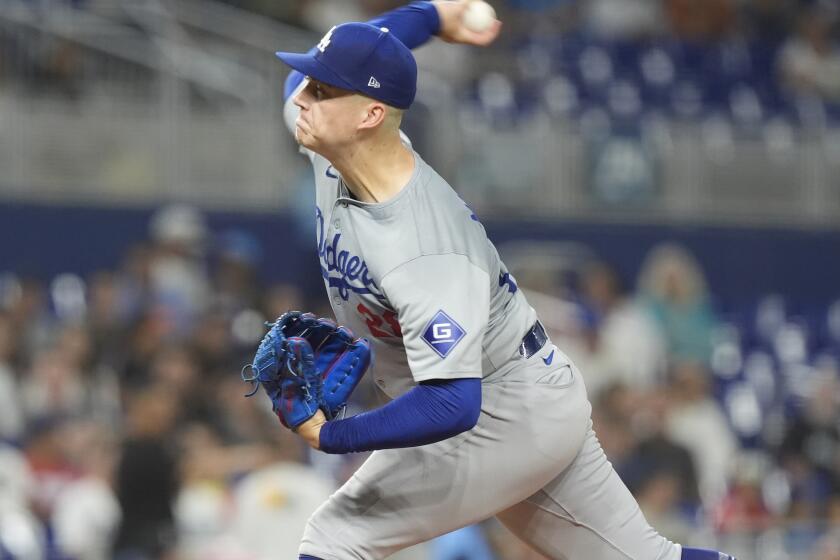Dodgers are soliciting sponsorship offers for naming rights to field at Dodger Stadium

Naming rights to the playing field, not the stadium, are up for sale. (July 19, 2017)
Mike Scioscia called Dodger Stadium home for the entirety of his 13-year major league career. He played on the last two Dodgers teams to win the World Series, in 1981 and 1988. To him, the ballpark on the hill should be known by one name, and one name only.
“Dodger Stadium,” Scioscia said.
In the future, that might not be such a simple matter. The Dodgers are soliciting sponsorship offers from companies interested in attaching their name to the field on which the team plays, and a winning bid from Acme Co. could mean the Dodgers would play at Acme Field at Dodger Stadium.
The Dodger Stadium name is not for sale, Dodgers President Stan Kasten said Tuesday.
“That has never been for sale,” Kasten said in Chicago, where the Dodgers played the White Sox on Tuesday night. “It never will be for sale.”
To the Dodgers, the possible sale of naming rights for the field is no different than the previous sales of naming rights for the stadium suites (BMW) or the baseline club (Ketel One) or the right-field pavilion (Coca Cola). Kasten said he is not concerned about the risk of sullying the name of an iconic stadium.
“We’re not worried about any discussions that we’re having now being a problem. We’re not selling the name of the stadium,” he said. “That’s the only thing I’m willing to tell you.”
According to Sports Business Journal, which first reported the potential sale, the Dodgers have pitched field naming rights for several months, with an asking price of $12 million per season. In February, the Dodgers confirmed that they would solicit investors interested in buying a minority share of the team. No deal on either front appears imminent.
Dodger Stadium opened in 1962, and generations of fans have grown used to the name. Fans would disregard a corporate prefix, said Bob Wagner, an Orange County sports and entertainment consultant who previously sold naming rights for the Angels and Ducks.
The Dodgers could mandate that their broadcast partners use a corporate field name, and the team could paint that corporate name on the field, but they could not reasonably expect fans to use it, he said.
“I think that’s going to be a challenge for Stan and the ownership group,” Wagner said. “If I was the Phoenix Coyotes, I’d give that name away as fast as I could to make money.
“But this is a different business model. It’s going to be called Dodger Stadium.”
Wagner said an interested company would have to weigh the risk of a short-term fan backlash against the long-term benefits of association with a team rich in tradition, one that regularly leads the major leagues in attendance and puts a winner on the field.
Jeff Marks, chief executive of Santa Monica-based Innovative Partnerships Group, negotiated the 2013 deal under which video game company Kabam bought rights to “Kabam Field at California Memorial Stadium,” the beloved 94-year-old home of the University of California football team. (Kabam pulled out of the 15-year deal this year.)
Marks said Kabam was perceived as a good citizen because it did not insist that its name replace the Memorial Stadium name, and by including scholarships and community involvement in the deal.
The name on the field need not be the only element of a deal. Generally speaking, Marks said, companies can expand a naming rights package to include advertising on a team’s broadcasts, sponsorship of promotional events at games and the right to hold corporate events at the venue.
However, the return on investment in such deals is in dispute among economists. Michael Leeds, chairman of the economics department at Temple University, has studied more than 50 naming-rights deals for North American sports facilities. Since the announcements of such deals generally are not followed by a short-term rise in stock price, he said, investors have concluded those deals do not generate a substantial profit.
“They might as well put the money in the bank,” Leeds said. “All this talk about branding and name recognition is nothing — it is literally nothing — if it doesn’t have any impact on profit.”
In May, Coliseum Commission President Mark Ridley-Thomas told The Times that USC had sold naming rights to the Coliseum to United Airlines. USC has not announced an agreement, but Ridley-Thomas said that, under the deal, “this historic landmark will always retain ‘Memorial Coliseum’ as a part of its name.”
Naming rights — to the ballpark, not just the field — are available at major league stadiums in Miami, Oakland, Seattle and Washington. The Dodgers’ sales pitch also could be complicated by the pending availability of naming rights for the NFL stadium the Rams and Chargers plan to share in Inglewood, starting in 2020.
In Anaheim, owner Arte Moreno has not sold stadium naming rights, in the interest of branding his team rather than a corporation. As he sat in Angel Stadium on Tuesday, Scioscia — now the Angels’ manager — said that he could only conceive of one alternate name for the ballpark in which he played.
“Dodger Stadium and Chavez Ravine,” Scioscia said. “That’s it.”
Times staff writer Andy McCullough contributed to this report from Chicago.
Follow Bill Shaikin on Twitter @BillShaikin
MORE SPORTS NEWS
Young Lakers look to Caldwell-Pope to add veteran leadership, defensive grit
Wardrobe change: NBA abandons traditional home, road uniforms with switch to Nike
More to Read
Go beyond the scoreboard
Get the latest on L.A.'s teams in the daily Sports Report newsletter.
You may occasionally receive promotional content from the Los Angeles Times.



